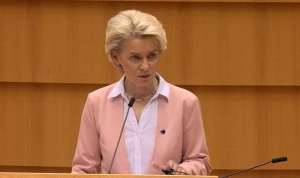Affairs that are more than two decades old are being brought to light like skeletons in the closet to march towards the ballot boxes, thus participating in the electoral struggle.
The self-outed undercover agent Robert Turcescu is currently feverishly active on his own website, as well as on a social network, just after announcing his potential retirement from the media on September 12th.
Immediately after outing himself, Robert Turcescu was saying: "I said that I was asking all of you for forgiveness (...) Starting tomorrow I will no longer be making this show. I don't know whether this is called retiring from the press. Until a righteous judge will say whether I've been wrong or not, up until that time, I don't have the strength to appear in public anymore. I can't live with that kind of burden anymore".
In his mind-boggling discourse at the time, which sparked much speculation, Robert Turcescu said: "This is not the end".
On October 2nd, however, he announced that he did not rule out the possibility of returning to media, and on October 14th he started posting various pieces of information on his website.
On October 25th, he started publishing information about the Megapower case, an affair from the 90s which involved several politicians and which apparently caused the Romanian state a loss of about 12 million dollars.
"Tic-Tock" are the words that Turcescu writes at the end of his messages, alluding that the clock is ticking, and who knows how, he, the undercover operative, is aware of this countdown.
MEP member of the Romanian Social Democratic Party recently said that Traian Băsescu's final strike in this campaign will be to try and tie Victor Ponta to the Megapower scandal, hinting that the current prime-minister may be charged with having helped some undercover agents of the Romanian Foreign Intelligence Service (SIE) avoid punishment.
Victor Ponta was the prosecutor who worked the Megapower case.
When asked to make a comment on the statements of Mircea Paşcu, Traian Băsescu said that he did not seek a final blow.
Naşul TV has scheduled Robert Turcescu in Radu Moraru's "Naşul" show last night - the first live appearance of Robert Turcescu since his self-outing as an undercover secret service operative.
Two weeks ago, Robert Turcescu was supposed to appear in a show on B1 TV, but the show in question was cancelled.
• Excerpts from the Megapower brief, published by Naşul TV
Robert Turcescu claims that the only person to be convicted in the Megapower affair - Cornel Moldovan, the former head of the IIRUC - was sentenced to ten years in prison, but he only served two and a half years of his sentence, and he was pardoned in 2003 by president Ion Iliescu.
The pardon decree was countersigned by Adrian Năstase.
We hereinafter reproduce several excerpts from the article of posted by Robert Turcescu on the Naşul TV website:
"The Megapower business was launched in 1990, at the initiative of Robert Deutsch and Cristian Lazarovici, two American residents of Romanian origin, and was approved through a Government Decision in 1991 by the prime-minister in office at the time, Petre Roman.
The goal of the company was for Romania to develop in the US, through a joint-venture - via IIRUC SA on the Romanian side - the manufacturing of cutting edge computing technology that would be used by Romania. The government pledged to pay 12 million dollars for that project through a government loan. The decision was signed by Petre Roman, Anton Vătăşescu, Theodor Stolojan, Victor Stănculescu and approved by Eugen Dijmărescu and Victor Babiuc, all of them members of the government.
After the outburst of the scandal, Petre Roman said that his only involvement in the project was approving the project through a government decision.
According to journalist Cornel Dumitrescu (co-editor of the "Lumea Nouă" publication in the United States), Robert Deutsch, who would also get involved in a scandal related to the first government led by Victor Ponta (ed. note: the appointment of Corina Dumitrescu at the Ministry of Education), was a colleague of Ion Iliescu during his education in the USSR. Son of illegal communist activists, Deutsch finished his studies in Moscow, returned to Romania and in 1966 he married the daughter of Dumitru Petrescu, a member of the Central Committee of the Romanian Communist Party. He was very close friends with Walter Roman, as well as in the inner circle of Nicolae Ceauşescu.
Deutsch held several important positions in the Ministry of Education, during the term of Mircea Maliţa, who sent him for a training scholarship at the University of Tubingen, of the Federal Republic of Germany.
Cornel Dumitrescu claims: «In 1974, he remained in Germany permanently, after he succeeded in «persuading» the German authorities that both him and his wife, whose mother was Jewish, were actually pure-blooded Germans. Even though they had taken refuge in the West, the Deutsch spouses kept their Romanian citizenship, and until the eighties they kept their ties to the regime of Nicolae Ceauşescu, even frequenting the Romanian embassy in Bonn. Very cunning, rather intelligent and speaking Russian, German and English, John Deutsch succeeded in making connections in Germany as well, and at one point he becomes no less than a sort of advisor-specialist on Eastern European issues to Helmut Kohl, who would later become the chancellor of the Federal Republic of Germany.
A few years prior to the events of December "89, Robert Deutsch together with his family was sent to America on a scholarship from the Stanford University, through the intervention of the German government, as a specialist in Eastern European issues, but where he focused mostly on "the study and assessment of the educational system in ... Mexico" (?!). Apparently, given his well known cunning, Robert Deutsch succeeded in becoming friends with former US state secretary George Schulz, who was, at the time, in charge of drawing up certain programs for the American diplomats that were going to work in Eastern European countries (...)
The friendship between Walter Roman and Dumitru Petrescu, the father-in-law of Robert Deutsch, strengthened by the fact that both of them had at one point fallen out of favor with Gheorghe Gheorghiu Dej and subsequently been rehabilitated by Ceauşescu, whom they faithfully served until his death, as well as the affinities between Robert's parents and the father of Petre Roman are the basis of the relationship between the two sons of communist nomenclature members.
Immediately after the revolution, Robert Deutsch traveled to Bucharest, where he was officially received by Ion Iliescu and Petre Roman. He subsequently laid the foundation for the Megapower business together with the Romanian government.
Christian Lazarovici was a professor at the Polytechnic Institute of Bucharest and upon his arrival in the United States, in 1975-1976, there were talks that he was an agent of the DIE (Foreign Intelligence Division). Being a specialist in electronics, he quickly managed to achieve an enviable financial situation.
• The Megapower case
In 1998, a container abandoned in the Port of Constanţa was opened by the Customs authorities in the presence of higher ranking police officers. The container held documents from the archive of Megapower, a company which, according to the US legislation was in bankruptcy. The customs authorities asked for the help of the Romanian Intelligence Service (SRI), as they thought that the police was not entitled to take possession of documents that pertained to national security.
Here is what the reporters of the "Ziua" newspaper wrote on the day the container was unsealed: «From confidential sources, the reporters of ZIUA have found that the Foreign Intelligence Service (SIE) led by Cătălin Harnagea knew about Megapower's notorious shipment from the very moment it left the US. The representatives of the Customs Department were notified by the SIE that Megapower would bring in a suspicious shipment in the Port of Constanţa, and asked them to watch it day and night, until the intended recipient arrived. Since the recipient did not show up, according to the law, after 150 days elapsed, the container became the property of the Romanian state.
The container was unsealed for the first time in the presence of customs officers and of a team of higher ranking police officers. Once the existence of secret documents which concerned the nation's security was revealed, the police officers proceeded with photocopying the documents. Customs officers thought that the Police did not have the necessary competence to investigate cases that concerned national security, and asked the police to stop any action and to notify the Romanian Intelligence Service (SRI) ».
Suspected of having helped rob the Romanian state, Christian Lazarovici sent in a right of reply to the Ziua newspaper, explaining his role in the company, which dignitaries were involved in the affair and where the money disappeared. (...)
• The full revelations of Lazarovici:
"Most of the pieces of information channeled in the press over the last few years about the MEGAPOWER affair have been premeditatedly made up to cover up one painful truth: MEGAPOWER was destroyed by the representatives of the Romanian investors for purposes that had nothing in common with the line of business of a commercial enterprise.
I would like to present in brief the real chronology of the main events pertaining to the existence of MEGAPOWER. The company was founded by me in 1989, with the goal of developing a new generation of power sources using a modified version of the VICOT technology. On that date, I was the vice-president of engineering in one of the divisions of the VICOR company and I had received the approval of the president of the company to follow that plan through. At the end of 1989, and in the beginning of 1990 I have contacted the first "venture capital" groups: MOHR, ALPHA PARTNERS and CONCORD PARTNERS in order to raise the funding needed for capitalization. In spring 1990, Robert Deutsch told me to present the business plan in Romania as well. The capitalization forecasted for the plant in the US and the opening of the Romanian division after two years of operation increased to 12 million dollars, twice what was needed for one operation in the US. IIRUC SA was designated as the official investor on the Romanian side and in exchange for an investment of 11.4 million dollars it acquired a majority stake. Four of the five positions of the Board of Directors were allocated to the Romanian investor, as follows: Cornel Moldovan, General Manager of IIRUC SA - chairman, Vasile Baltac, the minister of Electronics industry- member, Robert Deutsch, advisor of the Romanian government - member, and a vacant position that would be filled by Theodor Stolojan, the Romanian Prime Minister, once his term on the Romanian government expired in the autumn of 1992. The fifth position on the Board was held by me as a representative of the American management and general manager of the company.
One of the terms of the contract for the acquisition of shares was that any of the members of the company's management could be replaced using four votes. Thus, the Romanian investor had full control of the company from the very beginning. Even without prime-minister Stolojan on the board, another Romanian representative could be instantly appointed on the board. Also stipulated in the acquisition contract, was the fact that the opening of the Romanian division would take place two years after the firm started its operations, unless all of the five members of the management voted unanimously in favor of it happening earlier. Also, the contract for the acquisition of shares had stipulated the beginning of the prospecting of the European market, where the Romanian division was going to sell its products, in the spring of 1992.
After acquiring the VICOR license, the company began its activity in February 1992. Towards the end of 1992, MEGAPOWER already had its first line of products ready and its marketing process was already underway. The company had 54 employees and had the approval of the operating safety agencies. Unfortunately, during that time, several unfortunate events happened that were going to seal the tragic fate of the company. Robert Deutsch, who worked as vice-president for international affairs with a salary of USD 10,000 a month, refused to carry out the decisions of the management and did not even show up for work once. The American management asked for his dismissal, which led to an all-out war between the Romanian party, led by Minister Baltac, and the American party. In the summer of 1992, the Romanian party asked to be allowed to use some of the funds of the company to make various payments in Germany (without any connection to the company) and to buy electronic equipment for IIRUC SA. The American management started getting countless faxes which contained threats and insults from Baltac, Deutsch and Moldovan. Minister Vasile Baltac cancelled the action of prospecting the European market for the benefit of the Romanian division of the company. The company's entire staff was shocked at this never before seen situation: the Romanian minister in charge of the company's activity in Romania would oppose an action which was essential for the company's future, without any reason. This was the main sign for the American management that the Romanian party had different plans for MEGAPOWER.
Not long after that, a series of strange events started happening. The newly appointed member of the board, in the autumn of 1992, Finance minister Florin Georgescu, immediately asked for the opening of the European division and decided to put five million of the company's money into a separate account controlled by the Romanian investor. This immediately led to the company officially losing its credibility: audit firm Ernst&Young immediately withdrew its credibility rating ("on going concern"). Companies looking to use the MEGAPOWER source (Tektronix, HP and others) refused to place orders due to the lack of "on going concern". In the beginning of 1993, the company was unable to repay its licensing obligations because Minister Florin Georgescu wanted to open the European division in exchange for the release of funds for operation. Minister Vasile Baltac asked for my dismissal from the company. The conflict was made even worse by the preparation of a lawsuit by the management in order to preserve the existence of the company. Ministers Georgescu and Baltac suddenly resigned. They got replaced by higher ranking employees from the Ministry of Finance (advisor Alexandru Iordăchescu) and from the Ministry of Internal Affairs (director Iancu Dumitrescu). An audit commission from the Ministry of Finance led by Alexandru Iordăchescu was sent to the company. The Romanian employees got threatened with their assets being seized and their work visas being revoked, and they were asked to return to Romania right away. At the request of the Romanian party, two of them were illegally fired, which led to a lawsuit that the laid-off employees win. Amid these circumstances, the management of the engineering department resigned. The unstable situation of the company became public knowledge in the US industrial community. None of the major companies that used sources wanted to consider MEGAPOWER as a potential supplier. Gradually, other valuable employees left the company. It became obvious that a refinancing is necessary. ACMA of Singapore was willing to invest 3.5 million dollars as long as it shared control of the company with the Romanian party. The latter refused to hand over absolute control of the company. As a result, MEGAPOWER went bankrupt in the beginning of 1994 and filed for Chapter 11 Bankruptcy Protection according to the US federal laws.
The Văcăroiu government, through the Government decision of May 6th, 1994, empowered the Ministry of Finance and BANCOREX to recapitalize the company. As a result, the recapitalization was done through a dummy corporation, CONFIDENTIA, which acquired the majority stake. It became obvious that Mr. Alexandru Iordăchescu didn't even have the slightest clue on how to achieve a turnaround of the company. The management policy of Mr. Iordăchescu was to count the paper sheets received from Xerox and to write daily reports to minister Georgescu. Undisputed evidence that MEGAPOWER was only being kept alive for other purposes caused me to inform the Romanian government and the management of BANCOREX about the company's situation. Minister Florin Georgescu immediately asked the Board of Directors to dismiss me from the position of chairman. After my departure from the company, in October 1994, the former employees of the company informed me that the new general managers, George Popescu and later Grigore Maimuţ, did nothing more than continue the activity of Mr. Iordăchescu, for salaries that exceeded 100,000 dollars a year. I recently found out that the company did not even have a headquarters, but that it is still registered. The last engineers and workers (four of them) were not paid for the last three months of work they did in the beginning of this year. A lawsuit is ongoing at the Labor Department of the state of California. It is very likely that the company or the main shareholders will pay significant fines".
•
• The National Anti-corruption Prosecutor's Office (PNA) found that Stolojan was not involved in the Megapower deal
Liberal leader Theodor Stolojan was not heard nor was he a party in the lawsuit concerning the Megapower afffair, the Prosecutors' Office of the High Court of Cassation and Justice reported in 2004. Also, the National Anti-corruption Prosecutor's Office (PNA) reported that "it has not worked nor is it working on any case that has connections to this business. As a result, the PNA had no reasons to ask for documents in that regard from the Ministry of Public Finances".




















































1. fără titlu
(message sent by anonim on 18.09.2019, 09:30)
Real Secure Ordering Fluoxetine Website Visa Accepted Pharmacy Topical Propecia Hair Growth cialis 40 mg Pharmacies Shipping To Usa Discount Plavix Coupons Buy Nolvadex Uk
2. fără titlu
(message sent by anonim on 28.10.2019, 08:59)
Tadapox Pas Chere Achat Cialis Generique En France buy viagra Cialis Y Precio Cialis 20 Mg Posologia Wikipedia Cialis
3. fără titlu
(message sent by anonim on 13.01.2020, 17:16)
whe reTo Mail Order Cialis fr om India Buy Accutane Singapore Cialis Levitra Acquisto On Line Priligy Approuve Pays